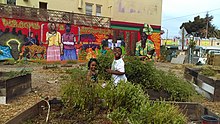Community space in West Oakland, USA (2011–2019))
| Qilombo | |
|---|---|
| Former names | The Holdout |
| Etymology | Based on Quilombo |
| General information | |
| Address | 2313 San Pablo Ave, CA 94612 |
| Town or city | West Oakland |
| Country | US |
| Coordinates | 37°48′50″N 122°16′29″W / 37.8138°N 122.2747°W / 37.8138; -122.2747 |
| Closed | January 9, 2019 |
| Owner | Neil Sullivan |

Qilombo (formerly The Holdout) was a community space in West Oakland, California, USA, that operated from 2011 through 2019. It was originally opened as an anarchist, self-managed social center then changed its name and focus in 2014 to become a community space for local Black and Brown people. The center initiated the Afrika Town project and created the Afrika Town garden on an empty lot adjacent to the Qilombo building. The garden was evicted in 2018 and the following year Qilombo itself was closed by Alameda County officials accompanying representatives of the owner.
History
The Holdout opened in 2011, at 2313 San Pablo Avenue in West Oakland. It operated for three years as an anarchist, self-managed social center. In January 2014, the Holdout closed its doors and was re-opened under the name Qilombo. The new African American collective announced in a statement that the name change honored the first quilombos (from the Kimbundu word "kilombo"), communities of Maroons established between the 16th and 19th centuries in South America as refuges from slavery and colonialism.
The collective aimed to represent the interests of Black and Brown people living locally. Over the next four years, Qilombo hosted events and launched the Afrika Town neighborhood revitalization campaign. It had a library and a freeshop; people could play chess and dominoes. Classes were given on Swahili, literacy, Maroon history, garderning, spiritual health, yoga and poetry.
Afrika Town
Afrika Town (also spelled Afrikatown) was an initiative started by members of Qilombo in 2014 that aimed to resist gentrification and support local communities. Programs included self-defense classes, free breakfasts, and needle exchange. After a mural was painted on the wall of Qilombo from a neighboring empty lot in 2014, local people decided to make the wasteland into a garden. Like Qilombo itself, the Afrika Town Garden was under threat of eviction because it was within the West Oakland Specific Plan (WOSP). The garden was built on land owned by real estate investor Noel Yi; in 2015, he began a campaign to evict the garden. The eviction process lasted three years. A court order dated March 5, 2018, granted a preliminary injunction in favor of Noel Yi, ordering Afrika Town to vacate the lot.
Closure
The building housing Qilombo was purchased by real estate mogul Neil Sullivan, who was buying up properties in West Oakland through his company SMC East Bay. In November 2016, SMC East Bay renewed their lease with Qilombo. However, after the Ghost Ship warehouse fire, they cancelled the agreement and sent city inspectors who told the project they could not organize public events. Qilombo resisted eviction and continued to occupy the space until January 9, 2019, when Alameda County officials accompanied the property managers to change the locks, closing it permanently.
References
- ^ Mary (May 19, 2016). "Come to the Afrikatown Anti-Eviction Block Party on May 28". San Francisco Bay View. Archived from the original on October 25, 2020. Retrieved September 10, 2020.
- "Best Anarchist Hangout". East Bay Express. July 18, 2012. Archived from the original on February 3, 2021. Retrieved January 29, 2021.
- "Announcing the Opening of the Qilombo Community Social Center". Anarchist News. August 9, 2014. Archived from the original on August 9, 2014. Retrieved September 9, 2020.
- "Qilombo". Resist. Archived from the original on August 6, 2020. Retrieved September 9, 2020.
- Tittle, Chris; Dell, Van (April 17, 2017). "Afrikatown Tour and Land Liberation Strategy Session". Sustainable Economies Law Center. Archived from the original on November 24, 2020. Retrieved January 30, 2021.
- "Featured Organization: Cantíl". Open Space. SF MOMA. June 19, 2018. Retrieved May 30, 2023.
- ^ Carl, Chelsea (February 11, 2023). "As a Teacher Who Dreams of Liberatory Education, This Is What Gives Me Hope". Truthout. Retrieved May 30, 2023.
- ^ Dalmas, Jeremy (March 2, 2017). "Oakland event spaces fight city over bureaucracy and inspections". KALW. Retrieved May 30, 2023.
- ^ Fireworks (April 8, 2015). "Cultivating resistance in AfrikaTown, West Oakland". San Francisco Bay View. Archived from the original on September 20, 2020. Retrieved September 17, 2020.
- Kay, Terri (April 12, 2015). "Activists save Community Garden, for now". Workers World. Archived from the original on November 27, 2020. Retrieved January 25, 2021.
- Tsai, Luke (April 3, 2015). "West Oakland Activists Vow to Defend Afrika Town Community Garden". East Bay Express. Archived from the original on December 3, 2020. Retrieved September 10, 2020.
- YI v. AFRIKA TOWN GARDENING COLLECTIVE, Leagle (Court of Appeals of California, First District, Division Four March 5, 2018).
- BondGraham, Darwin (April 2, 2014). "Neill Sullivan's Oakland". East Bay Express. Archived from the original on September 26, 2020. Retrieved September 27, 2020.
- Levin, Sam (January 4, 2017). "Underground arts scene threatened by widespread evictions after Oakland fire". The Guardian. Retrieved May 30, 2023.
- Id, Dave (February 1, 2019). "Oakland community center raided by police". Street Spirit. Archived from the original on February 28, 2021. Retrieved February 7, 2021.